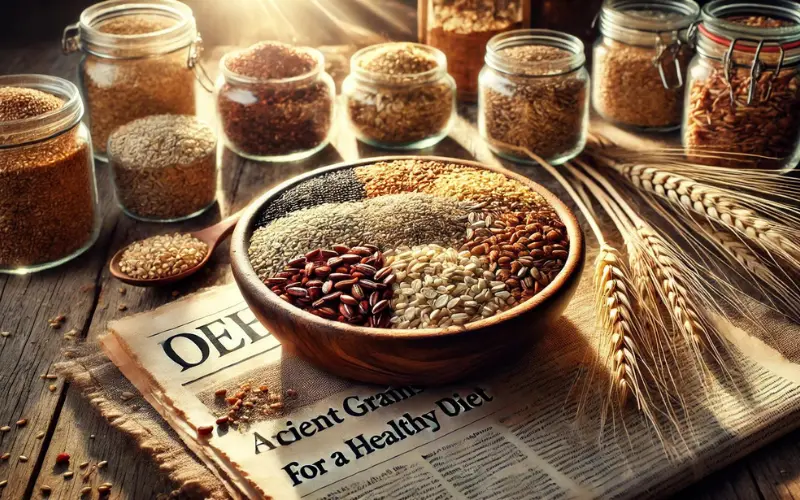The resurgence of ancient grains isn’t just a fleeting trend—it’s backed by scientific evidence showing how these grains support heart health, improve digestion, and contribute to maintaining a healthy weight. From their high fiber content to their abundance of antioxidants, ancient grains are a powerhouse in healthy cereals, transforming the breakfast experience into one that nourishes both body and mind.
What Are Ancient Grains?
Ancient grains refer to a group of grains and pseudo-cereals that have been cultivated in the same way for thousands of years. Unlike modern grains such as wheat, these grains have not undergone extensive breeding or hybridization. Some of the most popular ancient grains include quinoa, farro, spelt, amaranth, teff, and millet. These grains are celebrated not only for their history but also for their impressive nutritional profiles.
Quinoa, for instance, is a complete protein, meaning it contains all nine essential amino acids. Farro, an ancient wheat variety, boasts high fiber content, making it ideal for digestive health. Spelt, another ancient variety of wheat, is known for being easier to digest than modern wheat. Incorporating these grains into your daily diet can provide you with a broader range of nutrients that modern, highly processed grains often lack.
The Nutritional Value of Ancient Grains
Ancient grains are nutritional powerhouses. They are rich in essential vitamins and minerals such as magnesium, zinc, and iron. One of the standout benefits of ancient grains is their high fiber content, which aids digestion, regulates blood sugar levels, and promotes satiety—helping you feel full for longer. This is especially important in breakfast cereals, where the goal is to provide sustained energy throughout the morning.
In addition to fiber, ancient grains are excellent sources of plant-based protein. Quinoa, for instance, offers more protein than many other grains, making it a top choice for vegetarians and vegans. Moreover, ancient grains like amaranth and teff are rich in calcium and iron, two minerals essential for bone health and the prevention of anemia. Incorporating these grains into a daily cereal provides a solid nutritional foundation to start your day right.
Why Choose Ancient Grains Over Modern Grains?
The choice between ancient grains and modern grains boils down to nutritional content and processing. Modern grains, such as refined wheat and corn, have been bred and processed to increase yield and shelf life, often at the expense of their nutritional value. These grains are frequently stripped of their bran and germ, where much of their fiber and nutrients reside. This leaves behind a starchy endosperm that offers little beyond empty carbohydrates.
On the other hand, ancient grains have been largely unchanged over millennia. They are consumed in their whole form, retaining their fiber, protein, and nutrient content. This makes ancient grains a superior choice for those looking to improve their overall health through their diet. Additionally, because they are less processed, ancient grains have a lower glycemic index, meaning they cause slower, more stable increases in blood sugar levels compared to modern refined grains.
Ancient Grains and Digestive Health
One of the most significant benefits of ancient grains is their positive impact on digestive health. Thanks to their high fiber content, ancient grains help regulate bowel movements and prevent constipation. Fiber also acts as a prebiotic, feeding the good bacteria in your gut and promoting a healthy microbiome. This can lead to improved digestion, better nutrient absorption, and even enhanced immune function.
Cereals made with ancient grains such as farro, quinoa, and barley are particularly effective at supporting gut health. These grains provide a mix of soluble and insoluble fibers, which work together to improve digestion and promote regularity. If you suffer from digestive issues or are simply looking to improve your gut health, switching to a cereal that features ancient grains can be a simple and effective solution.
Ancient Grains and Protein Content
For those seeking to increase their protein intake, ancient grains offer a plant-based solution. Quinoa is one of the best-known ancient grains for its protein content. Unlike many plant-based foods, quinoa contains all nine essential amino acids, making it a complete protein. This is especially beneficial for vegetarians and vegans who may struggle to meet their daily protein needs without consuming animal products.
Other ancient grains, such as amaranth and spelt, are also rich in protein, though not complete proteins like quinoa. When combined with other plant-based foods, they can contribute significantly to a balanced, protein-rich diet. This makes ancient grain cereals an excellent choice for individuals looking to start their day with a protein boost, helping to support muscle repair, growth, and overall body function.
Conclusion
Incorporating ancient grains into your diet, particularly through healthy breakfast cereals, is a simple and effective way to boost your nutrition. These grains provide a wealth of benefits, from supporting digestive health to offering high levels of protein and essential nutrients. Whether you’re looking to improve your heart health, maintain a healthy weight, or simply start your day with a more nutritious meal, ancient grain cereals offer a wholesome, satisfying solution.
FAQs About Ancient Grain Cereals
Is ancient grain cereal better than regular cereal?
Can ancient grains help with weight loss?
What are the best ancient grains for gluten-free diets?
Do ancient grain cereals provide enough protein?
Are ancient grains environmentally friendly?
Can children benefit from eating ancient grain cereals?











